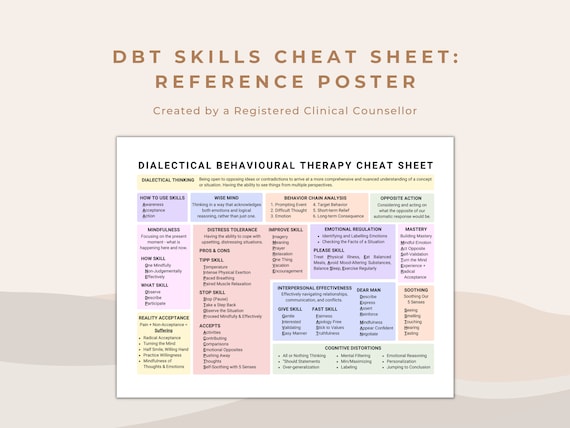Empowerment Through DBT London: Structure Resilience, Searching For Balance
Empowerment Through DBT London: Structure Resilience, Searching For Balance
Blog Article
Utilizing the Power of Dialectical Behaviour Therapy (DBT) Providers for Lasting Psychological Balance and Improved Relationships
In a globe where emotional health and keeping healthy partnerships are important components of a satisfying life, the usage of Dialectical Practices Therapy (DBT) services has actually become a beacon of expect many people. The structured and evidence-based strategy of DBT supplies a pathway in the direction of sustainable psychological balance and boosted interactions with others. By focusing in on core principles, individuals can establish crucial abilities for regulating emotions, enhancing interpersonal performance, and fostering mindfulness. Nonetheless, the real power of DBT lies not simply in recognizing these principles however in the sensible application of techniques in life. As we browse the intricacies of human emotions and relationships, utilizing the possibility of DBT services becomes a transformative journey worth exploring further.

Understanding the Core Concepts of DBT
Dialectical Behavior Therapy (DBT) is established upon a set of core concepts that underpin its healing technique to promoting emotional equilibrium and emotional health. Among the essential principles of DBT is dialectics, which highlights the synthesis of relatively contrary concepts to get here at a much more balanced viewpoint. This includes identifying and accepting the contradictions and stress within oneself, causing a greater sense of consistency and understanding. Mindfulness is another core principle of DBT, concentrating on being totally existing in the minute without judgment. By growing mindfulness, people can establish an enhanced awareness of their thoughts, habits, and emotions, permitting for higher self-regulation and psychological control.

Validation is also important to DBT, stressing the significance of acknowledging and approving one's experiences and emotions as valid. By integrating these core concepts right into therapy, DBT provides a reliable and extensive strategy to advertising emotional well-being and psychological resilience.
Developing Psychological Regulation Skills
Psychological policy skills are important components of Dialectical Behavior modification (DBT) that allow people to properly manage their feelings and navigate challenging scenarios with strength. These abilities incorporate the ability to identify and comprehend one's feelings, endure distress, manage intense feelings, and act according to personal worths also in the face of psychological chaos. Establishing psychological policy abilities includes discovering mindfulness methods to stay present in the minute, understanding the triggers that bring about psychological dysregulation, and executing coping techniques to regulate psychological feedbacks.

Enhancing Interpersonal Performance
Improving communication skills and promoting significant links with others are important facets of establishing this article social efficiency within the framework of Dialectical Actions Treatment (DBT) DBT shows individuals exactly how to interact properly, navigate social challenges, and create techniques for fixing conflicts in a useful manner.
One secret component of improving interpersonal efficiency in DBT is learning to recognize and handle emotions in social communications. DBT London. By enhancing emotional recognition, individuals can respond to others in a more understanding and understanding method. In addition, DBT emphasizes the importance of exercising mindfulness in social partnerships, motivating people to be existing in their interactions and completely involve with others
Practicing Mindfulness Techniques
Establishing a constant mindfulness practice is important for individuals undertaking Dialectical Behavior modification (DBT) to grow psychological guideline and enhance their interpersonal performance. Mindfulness strategies, a core element of DBT, entail focusing on the existing moment without judgment. Via mindfulness, individuals can end up being more knowledgeable about their thoughts, emotions, and bodily experiences, permitting them to react to situations with better quality and control.
One key mindfulness technique used in DBT is mindfulness meditation. This practice involves concentrating on the breath or a certain things while recognizing and letting go of any type of disruptive thoughts. By including mindfulness reflection into their daily routine, individuals can educate their minds to remain present and decrease reactivity to stressors.
Another vital facet of exercising mindfulness in Continue DBT is the principle of extreme acceptance. Radical approval includes completely embracing fact as it is, even when it is painful or challenging. By accepting today minute without judgment, individuals can lower their suffering and include positive modification.
Using DBT Methods in Daily Life
Building upon the structure of mindfulness methods such as meditation and extreme acceptance, individuals can integrate DBT methods right into their day-to-day lives to foster psychological equilibrium and enhance their interpersonal abilities. One reliable DBT technique is using dialectics, which urges individuals to locate the happy medium between 2 opposing thoughts or feelings. By exercising dialectics in everyday communications, people can discover to validate their very own sensations while also considering the viewpoints of others. Another important DBT skill for day-to-day live is distress tolerance, which entails learning how to deal with intense emotions without turning to harmful actions. This can be achieved with techniques such as self-soothing activities, distraction strategies, or enhancing the minute. In addition, social performance skills instructed in DBT can aid people connect their requirements assertively, established borders, and maintain healthy and balanced relationships. By continually using these DBT approaches in day-to-day live, individuals can experience sustainable emotional balance and boost their general wellness.
Verdict
.jpg)
Emotional regulation abilities are vital elements of Dialectical Habits Therapy (DBT) that enable people to efficiently manage their emotions and browse tough circumstances with strength.With DBT solutions, people can grow a much deeper recognition of their feelings, identify patterns of actions that add to emotional distress, and obtain sensible devices to regulate their feelings constructively.Developing a regular mindfulness practice is essential for people undergoing Dialectical Behavior Therapy (DBT) to grow psychological regulation and boost their interpersonal effectiveness.Building upon the foundation of mindfulness methods such as meditation and radical approval, people can incorporate DBT techniques right into their everyday lives to promote emotional balance and boost their social abilities. By understanding the core principles of DBT, creating emotional policy skills, improving social performance, practicing mindfulness techniques, and applying DBT strategies in day-to-day life, individuals can experience substantial enhancements in their overall well-being and relationships.
Report this page